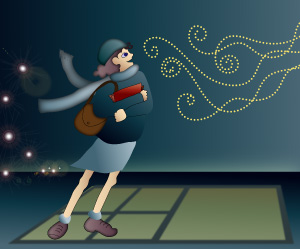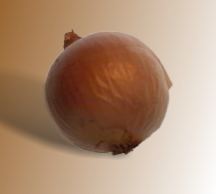 Smell of Onions Frying
Smell of Onions Frying
Take this journey back with me in time. Based on a journal entry from several years ago, the images are still strong for me... growing up... a powerful sense of belonging... a blossoming sense of independence and mastery.
It's about 3 minutes long:
3.14.2008
Original Text (4.14.00)
I've always loved
the smell of onions cooking in a frying pan. They signify
slowing down and taking care. You really can't sauté onions too fast
unless you have a taste for something charred and if you don't take
the time with the heat turned low the rest of the meal is tortured
by their raw crunch. They simply have to cook at their own pace.
When I was young the smell of onions being sautéed signaled the kind of meal I loved:
chili or, if we were lucky enough to have leftover beef, hash.
 The aroma of onions is the chatter of the pressure cooker and the blackness
of winter evenings through a steamed up kitchen window. There is
probably a television droning somewhere,
sisters arguing, brother and dad talking soccer, Lowell Thomas
announcing the news on radio, but the smell of onions takes
me elsewhere.
The aroma of onions is the chatter of the pressure cooker and the blackness
of winter evenings through a steamed up kitchen window. There is
probably a television droning somewhere,
sisters arguing, brother and dad talking soccer, Lowell Thomas
announcing the news on radio, but the smell of onions takes
me elsewhere.
Frying onions, chattering
pressure cooker, steamy dark windows: the memory
takes me into the streets. Wending my way home from high school
on winter evenings.
I went to Xavier
High School for Girls, adjacent to St. Louis University in
the center of the city. Sometimes my grandfather picked me up on his way home from work but I often stayed late for activities
or to study at the university library.
The library was new,
a big block of a building. I'd usually go with a girlfriend
and we'd find a table to spread out our papers and index cards
and books. We were always doing research for English class, struggling
to synthesize the wisdom of literary critics without plagiarizing
them. We worked under harsh deadlines and I still remember the sensation
of achy tiredness and the minty aftertaste of No-Doze. The library
smelled like a swimming pool. I don't know what combination of books,
carpeting and wooden furniture added up to that chlorinated conclusion
but I always thought of it that way. And I always felt like I was
floating along under water in there, in that squared-off container
for a sea of knowledge. Some nights it was a drag but it was a comfort
too: all the answers were there in the books and I was learning to
dig them out.
When we'd had enough,
we'd leave the library into the urban night. The direct way home was
a hike down West Pine and over Grand to catch the Lindenwood bus on
Market street — a good mile or so. But I was always carrying
about 20 pounds of books and the skirt-and-bobby-socks uniform meant chapped thighs in cold weather.
And the lonely walk along
Grand passed too many dark spaces and abandoned
warehouses.
Better to catch the
Lindell bus with my girlfriend, go all the way downtown
and transfer to the Lindenwood bus on Sixth Street outside Stix
Baer & Fuller.
Rush hour in winter: darkness and city lights. Lumbering loud buses with their stinking
exhaust. Honking horns. Why is this sensory image so powerful for
me? I was standing on the balcony at our hotel in Quito in 1998. The sun had set. It was rush hour and
a flood of "going home after school" images flowed over
me. Why is the memory more potent than going home in Daylight Savings
Time? Maybe going home in daylight
is more light-hearted. Dawdling is expected. You might be going somewhere
your parents tell you will be fun: like, ugh, softball practice.
Going home in darkness is more purposeful. The lights are on for you. The red tail lights have a destination. You've had a full day of business in winter — no spring fever, no gazing out the window at rustling trees. Night presses in and you make the transition. You may have an evening of studying ahead of you, but first your family will be waiting for you in the kitchen with the steamed window, the chattering pressure cooker, and the sweet smell of sautéed onions.
